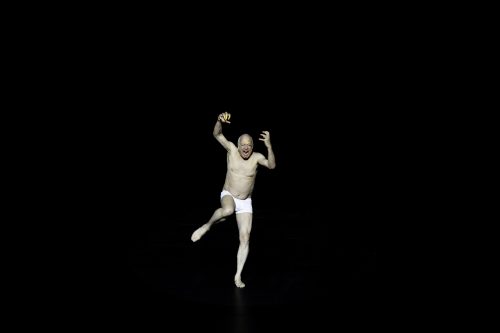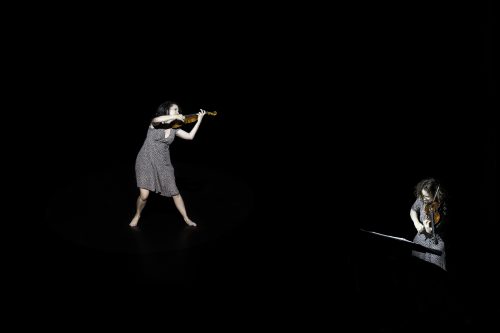 United Kingdom Competition d’Aix-en-Provence [3] – ‘Songs and Fragments’: Davies, Eight Songs for a Mad King; Kurtág, Kafka-Fragmente: Soloists, Ensemble Intercontemporain / Pierre Bleuse (conductor). Théâtre du Jeu de Paume, Aix-en-Provence, 10.7.2024. (MB)
United Kingdom Competition d’Aix-en-Provence [3] – ‘Songs and Fragments’: Davies, Eight Songs for a Mad King; Kurtág, Kafka-Fragmente: Soloists, Ensemble Intercontemporain / Pierre Bleuse (conductor). Théâtre du Jeu de Paume, Aix-en-Provence, 10.7.2024. (MB)

Manufacturing:
Director – Barrie Kosky
Design and Lighting – Urs Schönebaum
Forged:
Man – Johannes Martin Kränzle
Girl – Anna Prohaska
Violinist – Patricia Kopatchinskaja
Virtuosity of the very best diploma, totally on the service of musical drama, characterised this Aix manufacturing underneath Barrie Kosky’s route. Peter Maxwell Davies’s Eight Songs for a Mad King and György Kurtág’s Kafka-Fragmente shaped a staged double invoice, given and not using a break, at that eighteenth-century jewel amongst theatres, the Théâtre du Jeu de Paume. The ghost of Schoenberg’s Pierrot lunaire haunted proceedings, audibly within the Davies’s music theatre monodrama, written for the composer’s personal, Schoenberg-inspired Fires of London (right here, Schoenberg’s ensemble plus percussion), and extra scenically within the Kurtág fragments, not in fact meant to be staged, however right here given an intriguing new slant by way of the mediation of expressionist cabaret.
Johannes Martin Kränzle’s assumption of the mad king – referred to within the solid checklist merely as ‘Un homme’, although it’s in fact George III – was one thing by no means to be forgotten. Fairly how a lot was his, how a lot was Kosky’s, we will by no means know — and why ought to we explicit care? Theatre is collaborative, even in what may appear to be a one-man-show. With a single highlight, a single unsparing highlight, this poor (wealthy) man, clad solely in sagging underpants, bared his soul to the birds, the viewers, and certainly the musicians of the Ensemble Intercontemporain, incisively carried out by Pierre Bleuse, who in flip supplied us their very own, associated musical tour of caprice, parody, and brutal violence. From an early promenade, by way of the haunting of an imaginary but ever-so-real queen ‘Esther’, by way of the king’s beloved Handel – with biting irony, ‘Consolation ye…’, to the ultimate, surprising smashing of the violin, this was a psychological examine, which in a way revealed nothing aside from itself, and thus in one other sense proved all of the extra revealing. Via the numerous methods he marshalled his voice and his total physique, Kränzle touched, amused, and horrified us. It was gripping, concentrated theatre, which one may properly have wished to expertise once more, however knew one couldn’t, even when the try had instantly been made.

Anna Prohaska and Patricia Kopatchinskaja, minus the EIC, had been our guides for Kurtág’s extraordinary set of miniatures. The violin supplied, because it had been the bridge: destroyed and now resurrected by a one-woman orchestra who was additionally a protagonist — and by her double-companion. Equality right here, between two extra consummate musicians and communicators appeared, by advantage of staging and efficiency, the previous nonetheless astutely simple but minutely noticed, to be each instantly, immanently manifest and but additionally maintained by way of ever-shifting dramatic energy relationships: one conducting the opposite, one pulling the opposite’s strings, one inciting and consoling, and so forth. The place Davies’s expressionist nightmare had surprised us into submission, right here a special ghost of Pierrot – maybe surprisingly given the extra ‘summary’ nature of the work – proved extra based in re-gendered harlequin character. We turned inwards, Kurtág’s Webern-like miniatures commanding and receiving absolute focus, in a couple of sense. Prohaska’s spellbinding efficiency – think about having to sing that by coronary heart and have interaction in minutely deliberate bodily efficiency too – was inconceivable to dissociate from Kopatchinskaja’s. The 2 musicians appeared virtually to emerge as two emanations of the identical soul. A response to their male counterpart within the first half, or one thing subtly but, in that subtlety, defiantly totally different? Why select? Once more, there was a lot one couldn’t probably have taken in, which cried out for one more likelihood to take action, but which was tantalisingly misplaced within the passage of concentrated time. Above all, although, and this can be the last word ‘lesson’, we discovered a bit higher to pay attention to at least one one other.
Mark Berry


